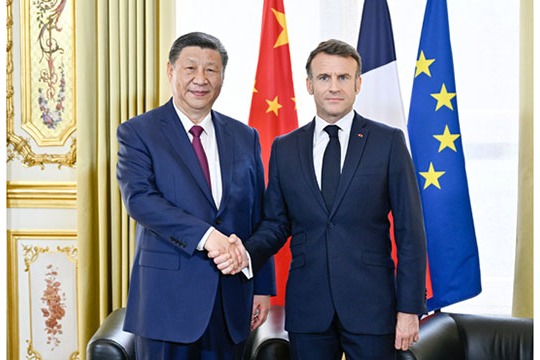Expert links research to stock valuations
'Patient capital' seen as necessary to encourage investment, spur firms' R&D


As China steps up capital market reforms to support its modernization drive, a finance expert has underlined the need to integrate broader societal benefits into stock valuations, to encourage listed firms to invest in basic research.
"By adjusting valuation mindsets and models, we can enable enterprises that engage in substantial basic research to have their investments recognized by the market. This will incentivize them to make more of such investments," said Liu Qiao, dean of Peking University's Guanghua School of Management and a professor of finance.
In an exclusive interview with China Daily, Liu said that a key means to achieve this is to attract more qualified, institutional long-term investors to the A-share market.
A meeting of the Political Bureau of the Communist Party of China Central Committee on April 30 stressed that it is essential to actively develop venture capital investment and strengthen "patient capital" — investment that generates healthy returns over the long run rather than quick profits.
On April 22, Liu gave a briefing at a study session of the State Council, China's Cabinet, that focused on further reforms in the capital market for its steady and healthy development.
Liu told China Daily that China still has significant progress to make in enhancing basic research, emphasizing basic research as a fundamental driving force of the country's modernization efforts and highlighting the potential of the capital market in facilitating basic research.
Liu said there are some Chinese centrally administered State-owned enterprises and other SOEs, as well as small to medium-sized, innovation-oriented companies that invest significantly in basic research, which generates strong positive externalities in advancing the society's technological and knowledge bases.
But the highly uncertain outcomes of fundamental research make it difficult for them to secure predictable accounting profits and receive appropriate recognition in terms of stock valuations, leaving them often undervalued in the capital market, he said.
Partially due to this reason, while Chinese enterprises contribute over three-quarters of the country's research and development expenditures, they only allocate a fraction of that expenditure to fundamental research, he said.
By comparison, in the United States, enterprises are pivotal in driving basic research as its capital market tends to give higher valuations to companies that invest heavily in this area, Liu said. Microsoft, for example, has seen a significant rise in its valuation following its substantial investments in basic research in artificial intelligence.
All this suggests that China's capital market should develop a valuation system whereby the positive spillover of enterprises' basic research, along with other social values they create, are reflected in their share prices so that they are willing to invest further in basic research, Liu said.
Nurturing more qualified, institutional long-term investors who are capable of, and can benefit from, investing in the companies that conduct basic research and generate positive externalities would be critical to building such a valuation system, Liu said.
Relevant efforts are underway as the State Council released a guideline last month that outlined nine measures to boost the high-quality development of the capital market, requiring stricter supervision of share-selling by listed companies' big shareholders and stronger incentives for dividend payouts.
The guideline, deemed a once-in-a-decade blueprint for China's capital market, also called for guiding the entry of medium and long-term capital by optimizing policies to facilitate insurers' long-term investment in equities and refining the evaluation standards of mutual fund management companies.
Channel Yeung, a market analyst at financial trading platform FXTM, said the recent push for listed companies to increase dividend payouts and share buybacks is poised to attract more patient, foreign capital into the A-share market.
As China's A-share market recovers, 71.3 billion yuan ($9.9 billion) of foreign capital flowed into A shares in the past three months via northbound trading in the stock connect programs, which link the Shanghai and Shenzhen markets with the bourse in Hong Kong, said market tracker Wind Info.
Official data showed that the proportion of basic research in China's total R&D expenditures in 2023 reached 6.65 percent, while the 14th Five-Year Plan (2021-25) has demanded efforts to elevate the proportion to more than 8 percent.
Liu said the figure of 6.65 percent also lags behind that of many developed economies like the US (where the figure stands at about 15 percent) and France (more than 20 percent).
To promote policy synergy in boosting basic research, Liu underscored the need to give tax breaks to enterprises' basic research and allocate some of the proceeds of the country's ultra-long-term special treasury bonds into this area to crowd in more private investment.
"By combining these potential methods, along with a substantial influx of fiscal funds, the proportion of basic research investment should rapidly increase. This will have a significant positive impact on China's economy and its high-quality development."
Ouyang Shijia contributed to this story.



































